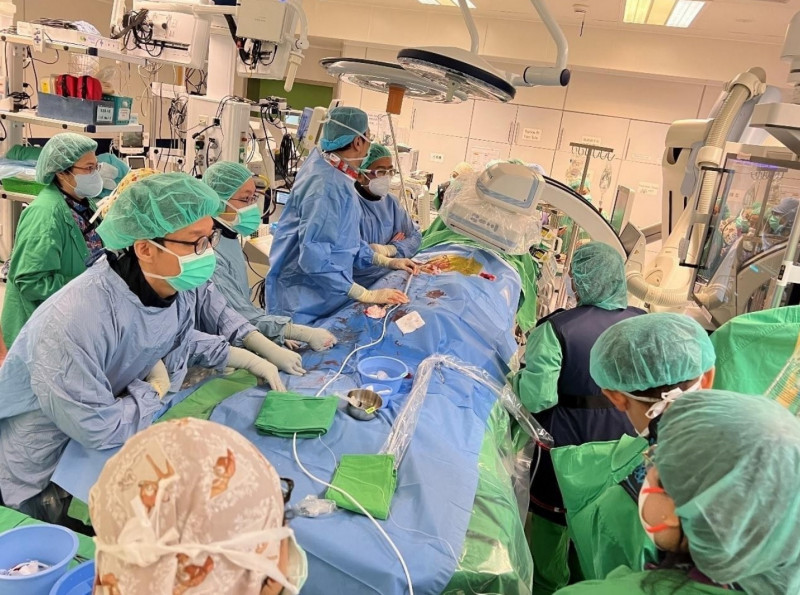The Beirong medical team performed the ECPELLA treatment process for Ms. Chen.
(Provided by Beirong)
[Reporter Lin Huiqin/Taipei Report] 34-year-old Ms. Chen was pregnant due to infection and induced labor, and subsequently suffered from heart and multiple organ failure. After using Ye Kemo for 3 days, her heart function still did not recover well, and she was afraid of a heart transplant. However, the Taipei Veterans General Medical Team The first domestic ECMO (Ye Kemo) and IMPELLA (percutaneous ventricular assist device) "ECPELLA" (ECPELLA) was used to treat acute heart failure, not only successfully saved a life, but even avoided thoracotomy and transplantation.
Doctors pointed out that this kind of treatment can reduce about 30% of heart transplants, which is a new trend of "saving hearts" in the future.
When Ms. Chen was 21 weeks pregnant, severe intra-abdominal infection occurred and labor must be induced. However, after induction of labor, she still developed septic shock, causing heart and multiple organ failure. She was rescued with pressors and respirators, and her heart function was only limited. Less than 1/4 left.
Please read on...
Ms. Chen's husband recalled the situation and was still choked with tears. He said that one day at the end of October, after taking his wife for lunch, something went wrong to the obstetrics and gynecology clinic. The heartbeat was weak due to the infection, so I had to make a choice, but after the induced labor operation, I took the baby back to the freezer, and my wife went into a coma, and I was a little bit broken when I heard the words "Ye Kemo". I am very grateful to the medical team for "saving my wife to life." , Now it is no problem to walk and climb stairs.
Ms. Chen gradually recovered after receiving Ye Kemo and the "Acapella" treatment of the percutaneous ventricular assist device; the picture shows Ms. Chen and her husband.
(Photo by reporter Lin Huiqin)
Ms. Chen's husband shared how his wife's condition took a turn for the worse, and he was a little bit overwhelmed.
(Photo by reporter Lin Huiqin)
Beirong Cardiac Surgeon Chen Yiming said that acute heart failure usually recovers gradually after 3 to 7 days of using Ye Kemo, but Ms. Chen still does not improve after 3 days, and she needs to receive a ventricular assist device for evaluation and enter the waiting process for a heart transplant.
However, with donations from well-meaning enterprises such as Jianhe Industrial and Puzhong Enterprises, the hospital introduced the latest percutaneous ventricular assist device, combined with the original Yeke membrane, which successfully improved acute heart failure, and even left the Yeke membrane on the 3rd day after surgery. On the 6th day, he was removed from the ventricular assist device and recovered his spontaneous heartbeat. On the 9th day, he was removed from the ventilator. On the 11th day, he was transferred to the general ward. On the 22nd day, he was discharged smoothly.
Chen Yiming pointed out that the ventricular assist device mainly replaces the function of the heart, allowing the heart to rest completely, waiting for recovery or heart transplantation.
Compared with the traditional ventricular assist device, which requires a thoracotomy, the wound length is about 20 cm, the operation takes about 6 to 8 hours, the risk is higher, and the recovery period is slower, the percutaneous ventricular assist device can be regarded as a higher-order Yeke membrane. It has been clinically used abroad for 5 years. It is implanted by peripheral blood vessels, usually through the femoral artery in the groin or the axillary artery under the clavicle, and then delivered to the junction of the ascending aorta and the left ventricle to assist the beating of the heart. The wound is only a puncture hole size, and can improve the defect of Ye Ke membrane, reduce the burden on the left ventricle and cardiopulmonary blood stasis, prevent thrombosis and pulmonary edema, and even reduce heart transplantation by about 30%, and the one-year survival rate after operation is as high as about 92% and 93%.
However, three attending physicians from the Department of Cardiac Surgery and three from the Department of Anesthesiology, as well as other medical staff, were dispatched throughout the process. Teamwork is very important.
The Beirong medical team performed the ECPELLA treatment process for Ms. Chen.
(Provided by Beirong)
Zhang Xiaohuang, director of Beirong Heart Transplantation and Artificial Heart Center, explained that Ye Kemo has a history of at least 20 or 30 years and has not made new breakthroughs. However, Ye Kemo combined with percutaneous ventricular assist device is currently the most advanced treatment for acute heart failure. , and it has also been introduced in China soon. A ballpoint pen-sized instrument combined with a micro-motor can play the role of a traditional large-scale auxiliary device, providing a blood flow of 5 liters per minute. heart function.
Zhang Xiaohuang mentioned that the golden period for patients with acute heart failure to use Yekemembrane to wait for heart transplantation is usually 9 to 14 days. According to the current domestic situation, it may be at least 1 month until the heart is transplanted. However, if Yekemembrane is combined with percutaneous The ventricular assist device can help prolong the golden period to more than 1 month, and even restore heart function like Ms. Chen, without having to go for a transplant.
However, there is currently no health insurance payment, and the out-of-pocket cost of consumables alone is about 1 million yuan.
Ms. Chen (4th from right) and her husband (3rd from right) are very grateful for the assistance of Beirong medical team and charitable enterprises.
(Photo by reporter Lin Huiqin)
☆Health news will never be missed, click like to follow the fan page.
☆For more important medical news, please go to Liberty Health.com.
keywords
Ye Kemo
maternity
Acapella
heart failure
percutaneous ventricular assist device
related news
